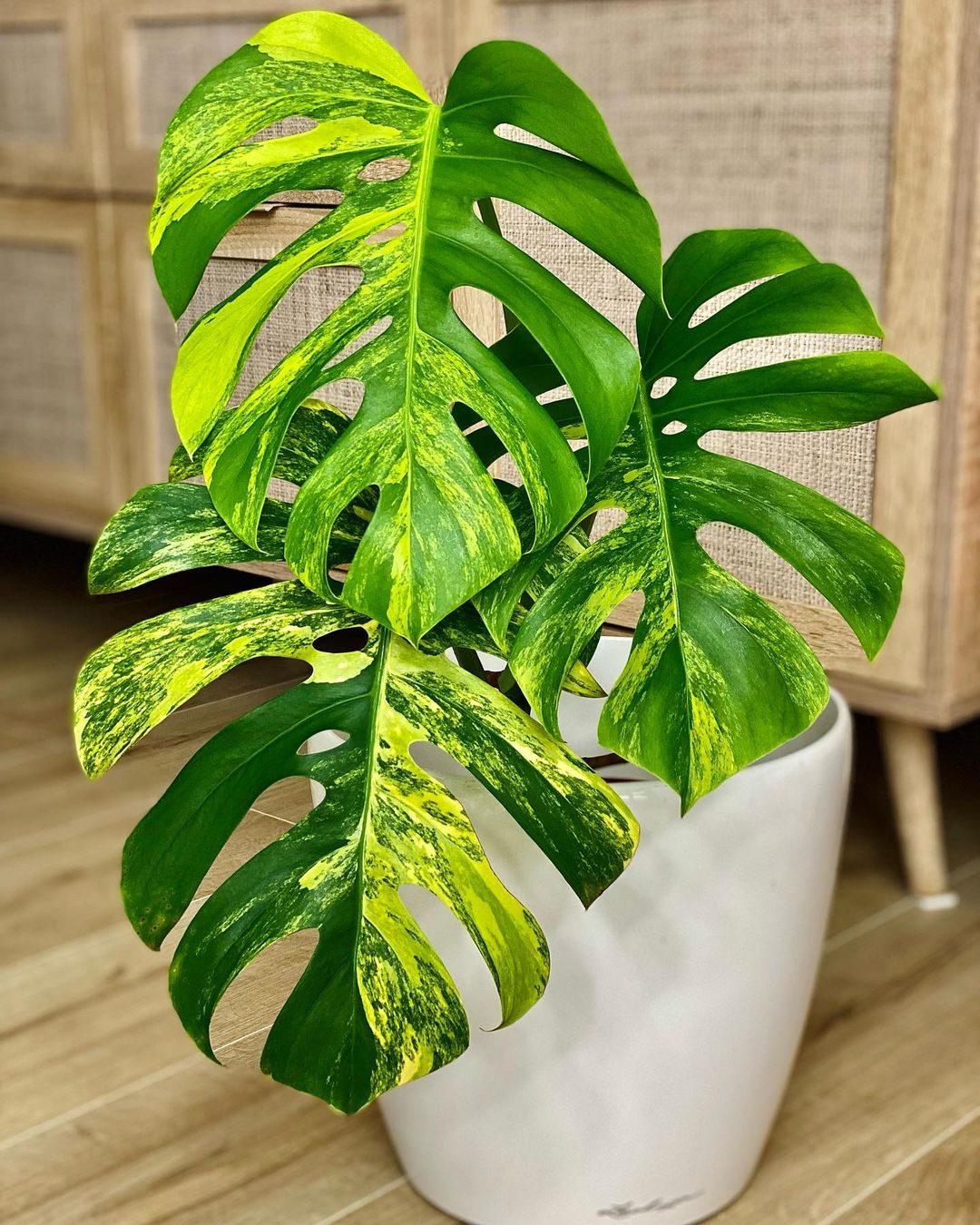Monstera Aurea is a rare variegated form of Monstera deliciosa with yellow or golden leaf patches. It requires bright indirect light, high humidity, and well-draining soil. Water when the top 2-3 inches of soil are dry and fertilize monthly during the growing season.
As a horticulturist with over 15 years of experience specializing in tropical houseplants, I’m excited to share my knowledge about the stunning Monstera Aurea. This guide will provide you with everything you need to know to successfully grow and care for this coveted variegated beauty.
Understanding Monstera Aurea

What is Monstera Aurea?
Monstera Aurea is a variegated form of the popular Monstera deliciosa, also known as the Swiss Cheese Plant. The ‘Aurea’ in its name refers to the golden or yellow variegation on its leaves, which sets it apart from other Monstera varieties.
Variegation Patterns
The variegation in Monstera Aurea can appear in various patterns:
- Sectoral: Large sections of the leaf are yellow or golden.
- Marbled: Small patches of yellow scattered across the leaf.
- Half-moon: One half of the leaf is yellow, the other green.
It’s important to note that variegation is unstable and can change over time.
Growing Conditions for Monstera Aurea
Light Requirements
Monstera Aurea needs bright, indirect light to maintain its variegation. However, direct sunlight can scorch its leaves.
- Place near a north or east-facing window for optimal light.
- Use sheer curtains to filter intense afternoon sun.
Temperature and Humidity
These tropical plants thrive in warm, humid conditions:
- Ideal temperature range: 65-85°F (18-29°C)
- Humidity level: 60% or higher
Soil and Potting
Monstera Aurea requires well-draining soil to prevent root rot:
- Use a mix of peat moss, perlite, and orchid bark.
- Ensure the pot has drainage holes.
Caring for Your Monstera Aurea
Watering
Proper watering is crucial for Monstera Aurea:
- Water when the top 2-3 inches of soil feel dry.
- Use room temperature water to avoid shock.
- Reduce watering in winter when growth slows.
Fertilizing
Feed your Monstera Aurea during the growing season:
- Use a balanced, water-soluble fertilizer monthly.
- Dilute to half-strength to avoid over-fertilization.
Pruning and Maintenance
Regular pruning helps maintain the plant’s shape and health:
- Remove yellow or damaged leaves.
- Prune to control size and encourage bushier growth.
- Clean leaves regularly to remove dust.
Propagation Techniques
Stem Cuttings
The most common method to propagate Monstera Aurea:
- Choose a healthy stem with at least one node.
- Cut below the node with clean, sharp scissors.
- Place the cutting in water or moist soil.
- Keep warm and humid until roots develop.
Air Layering
A more advanced technique for larger plants:
- Make a small incision on the stem below a node.
- Apply rooting hormone to the wound.
- Wrap with moist sphagnum moss and plastic.
- Once roots form, cut below the new root ball and pot.
Common Issues and Troubleshooting
Loss of Variegation
If your Monstera Aurea is losing its yellow coloration:
- Increase light exposure gradually.
- Prune predominantly green leaves to encourage variegated growth.
Pests
Common pests include spider mites and mealybugs:
- Inspect regularly for signs of infestation.
- Treat with neem oil or insecticidal soap.
- Isolate affected plants to prevent spread.
Overwatering
Symptoms of overwatering include yellowing leaves and root rot:
- Ensure proper drainage in the pot.
- Allow soil to dry between waterings.
- If root rot occurs, repot in fresh, dry soil after trimming affected roots.
Displaying Your Monstera Aurea
Styling Tips
Showcase your Monstera Aurea’s beauty:
- Use a moss pole or trellis for support as it grows.
- Place in a decorative pot that complements its foliage.
- Group with other tropical plants for a lush display.
Growing Monstera Aurea can be a rewarding experience for plant enthusiasts. With proper care, this rare beauty can become a stunning focal point in your home. Remember that patience is key – these plants grow slowly, especially compared to their non-variegated counterparts. Enjoy the process of nurturing your Monstera Aurea and watching its unique patterns develop over time.
By following this guide, you’ll be well-equipped to provide the best care for your Monstera Aurea. Happy growing!
Exotic Cut Flowers : Adding Tropical Flair to Your Arrangements

